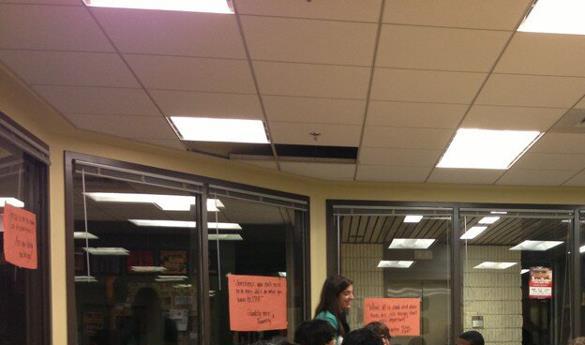Students provide input on Code of Conduct
George Mason University's Student Government held a roundtable discussion with students and University Life representatives on Tuesday Feb. 26 to gain input about the Student Code of Conduct.
“This is the first year we are sitting down to discuss the code in its entirety and get student feedback,” Rachel Grimesey, a student senator and junior government and international politics major, wrote in an email.
After several students and student government members brought up concerns about the drug policy, the student government met with the director of student conduct, Brent Ericson. They decided to hold the round table discussion and to include the entire code of conduct in the discussion.
“We understand that the drug policy is a hot topic, but we want to make sure that all students with concerns about university policies have an opportunity to bring them to us,” Grimesey wrote.
Input from the round table will be sent to the Office of Student Conduct, where, according to Ericson, Student Government Association representatives and the Office of Student Conduct will review the information to better understand student concerns and perspectives.
At the round table, students discussed specific incidents of concern as well as general issues with the code of conduct.
Some students brought up the process of attending a hearing before being proven guilty for a violation.
“It’s like they’re head hunting almost, and it’s ridiculous,” one student said.
Other students expressed having a cease and desist placed on their organizations for almost a whole semester. A student who used to work for the Office of Student Conduct said that the code is changed periodically with “no opportunity for students to put their two cents in.” This year’s version of the code excludes the right for a student’s investigation to proceed without delay.
When discussing the Code of Conduct and applying to students outside of campus, students compared the code to those of other schools, such as the University of Virginia.
“Why should we be giving up our rights to help the university? The university should be helping us out,” one student said.
The mediator anticipated that no immediate change would happen; rather, the goal was for the Code of Conduct to be improved by summer or fall 2013.
Grimesey wrote that past discussions about the drug and alcohol parts of the code led to the student senate passing resolutions endorsing a Good Samaritan, or medical amnesty policy. The policy would mean that a student partaking in illegal substances who is in need of medical assistance will be protected from punishment, as well as any students who call for help.
Such policies have been enacted in other universities, including William and Mary and UVa, Mason does not have one.
“Communicating student concerns with administration is our primary responsibility,” Grimesey wrote, “so holding this roundtable is a great opportunity for us to receive student input.”

